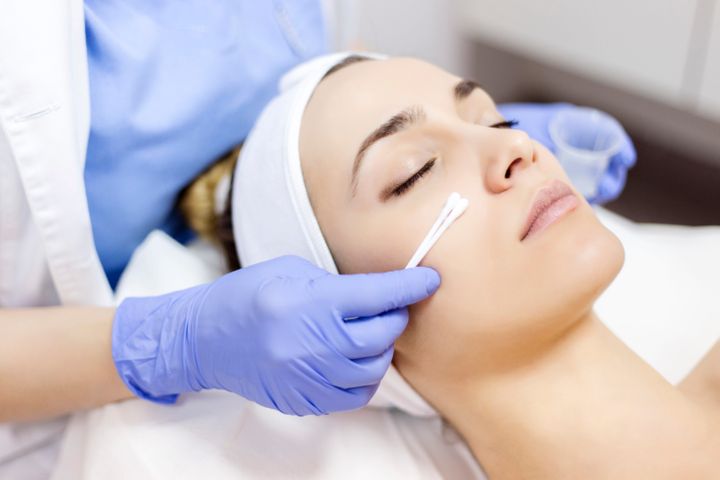Chemial Peels - Abu Dhabi - Dubai
Superficial chemical peels are cosmetic treatments that involve the application of a chemical solution to the skin to exfoliate and improve its appearance. These peels are typically milder and target the outermost layer of the skin, known as the epidermis. They are commonly used to address minor skin concerns such as fine lines, wrinkles, uneven skin tone, and mild acne.
Here are some key points about superficial chemical peels:
- 1. Procedure: During a superficial chemical peel, a chemical solution is applied to the skin, usually on the face, and left on for a specific period of time. The solution is then neutralized or washed off. The entire procedure is relatively quick, usually taking around 30 minutes to complete.
- 2. Types of acids: Various types of acids can be used in superficial chemical peels, including alpha hydroxy acids (AHAs) such as glycolic acid and lactic acid, and beta hydroxy acids (BHAs) like salicylic acid. These acids work by loosening the bonds between dead skin cells, promoting their shedding and revealing fresh, smoother skin.
- 3. Mild exfoliation: Superficial chemical peels provide a mild exfoliation of the skin. They remove the outer layer of dead skin cells, which can help improve the texture and tone of the skin. This process can also stimulate collagen production, leading to a more youthful appearance.
- 4. Minimal downtime: One of the advantages of superficial chemical peels is that they typically have minimal downtime. The skin may appear slightly red and feel slightly sensitive immediately after the procedure, but these effects usually subside within a few hours to a few days. Most people can resume their regular activities immediately after the treatment.
- 5. Multiple sessions: To achieve optimal results, multiple sessions of superficial chemical peels are often recommended. The exact number of treatments depends on the individual's skin condition and desired outcome. Typically, treatments are spaced several weeks apart to allow the skin to recover between sessions.
- 6. Results: Superficial chemical peels can improve the overall texture and appearance of the skin. They can help reduce the appearance of fine lines, smooth out rough skin, diminish the appearance of sunspots or mild pigmentation irregularities, and improve acne-prone skin. However, for more significant skin concerns, deeper chemical peels or alternative treatments may be more appropriate.
- 7. Precautions: While superficial chemical peels are generally safe, it is important to follow the instructions provided by the dermatologist or skincare professional performing the procedure. Some people with certain skin conditions, such as eczema or rosacea, may not be suitable candidates for chemical peels. It is essential to consult with a qualified professional to determine if a superficial chemical peel is suitable for your specific skin type and concerns.
Remember, this information is not a substitute for professional medical advice. If you are considering a superficial chemical peel or any other cosmetic treatment, it is best to consult with a qualified dermatologist or skincare professional to discuss your options and ensure the procedure is appropriate for you.

